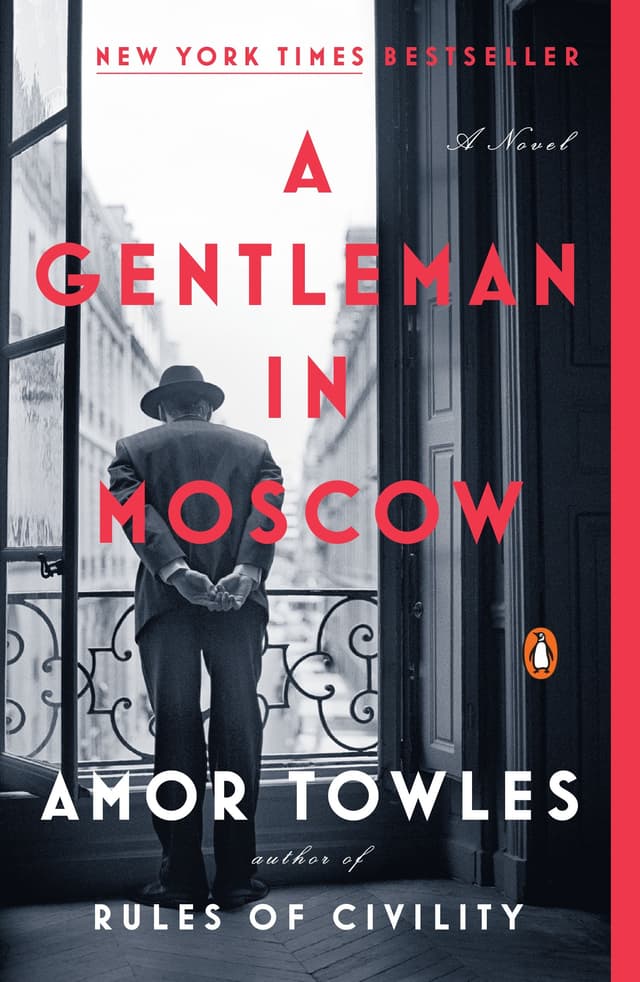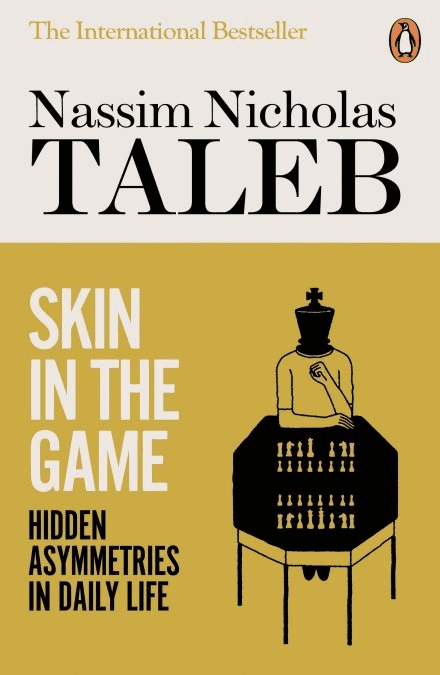A Gentleman in Moscow by Amor Towles vs. Skin in the Game: Hidden Asymmetries in Daily Life
A Gentleman in Moscow by Amor Towles
A Gentleman in Moscow is a historical fiction novel by Amor Towles. It follows Count Alexander Rostov, a Russian aristocrat who, after the Bolshevik Revolution, is sentenced to house arrest in the grand Hotel Metropol in Moscow. Instead of being imprisoned in a cell, he’s confined to the hotel, which becomes both his cage and his world. The story spans several decades, starting in the 1920s and running through key moments of Soviet history. Most of it unfolds inside the hotel, which is no ordinary place—it's a bustling, self-contained universe. Rostov, who begins the story living in a lavish suite, is forced to move into a tiny attic room. Despite this fall from grace, he navigates his new life with wit and charm, forming friendships with the hotel staff, guests, and unexpected visitors. The book isn’t just about the Count’s personal journey—it’s also about how time changes people and places, how history creeps in even when you’re standing still, and how small acts of kindness and lo...
Skin in the Game: Hidden Asymmetries in Daily Life
Skin in the Game: Hidden Asymmetries in Daily Life is a nonfiction book by Nassim Nicholas Taleb, published in 2018. Taleb’s main point is pretty simple: people should share in the risks of the decisions they make. If you benefit from something, you should also face the downsides if things go wrong. He calls this having “skin in the game.” Without that, people can make reckless choices that hurt others while staying safe themselves. The book covers everything from politics and business to religion and everyday life. Taleb doesn’t hold back on criticism. He talks about how some policymakers and financial experts make decisions that affect millions but don’t suffer when those decisions backfire. He uses examples like bankers profiting during booms but getting bailed out during crashes. Taleb also goes after what he calls “Intellectual Yet Idiot” types—educated people who, in his view, complicate things and give advice without understanding real-world consequences. He argues that real k...


Reviews
Reviewed on 2/23/2025
Count Alexander Ilyich Rostov, a Russian aristocrat is sentenced to house arrest in his residence at a luxury Hotel Metropol in Moscow. The story spans decades, as Rostov develops friendships, enmities and relationships with the staff and guests at the Metropol. I've actually listened to this story as an Audible audiobook two or three times.
Reviews
| Item | Votes | Upvote |
|---|---|---|
| No pros yet, would you like to add one? | ||
| Item | Votes | Upvote |
|---|---|---|
| No cons yet, would you like to add one? | ||
| Item | Votes | Upvote |
|---|---|---|
| Insightful and provocative arguments | 1 | |
| Applies to various aspects of life | 1 | |
| Engaging and accessible writing style | 1 | |
| A sensible approach to ethics | 1 |
| Item | Votes | Upvote |
|---|---|---|
| Some arguments can be repetitive | 1 | |
| Taleb's confrontational tone may not appeal to everyone | 1 |
Frequently Asked Questions
'A Gentleman in Moscow' offers a rich narrative focused on character development and historical context, making it ideal for readers who enjoy literary fiction and deep storytelling. In contrast, 'Skin in the Game' presents thought-provoking ideas on ethics and decision-making, appealing to those interested in philosophy and practical applications in daily life. The choice between the two depends on whether you prefer a fictional narrative or a philosophical exploration of risk and accountability.
'Skin in the Game' is designed to offer practical insights into ethics and decision-making, emphasizing the importance of personal risk in achieving fairness. It is particularly beneficial for readers looking for applicable lessons in their lives. On the other hand, 'A Gentleman in Moscow' is more of a character-driven story that, while rich in themes of resilience and adaptation, may not provide the same level of practical insights as Taleb's work.
'A Gentleman in Moscow' is often praised for its lyrical prose and immersive storytelling, making it a captivating read. Conversely, 'Skin in the Game' features an engaging and accessible writing style, though some readers may find Taleb's confrontational tone off-putting. Ultimately, the preference for writing style may vary based on individual taste, with some readers favoring the elegance of Towles' narrative and others appreciating Taleb's direct approach.
'A Gentleman in Moscow' is a historical fiction novel by Amor Towles that follows Count Alexander Rostov, a Russian aristocrat sentenced to house arrest in the Hotel Metropol in Moscow after the Bolshevik Revolution. The story spans several decades, exploring Rostov's life within the confines of the hotel, his relationships with staff and guests, and the impact of historical events on his existence.
The author of 'A Gentleman in Moscow' is Amor Towles, an American novelist known for his engaging storytelling and richly drawn characters.
'A Gentleman in Moscow' explores themes such as the passage of time, the impact of history on individual lives, the importance of friendship and loyalty, and the resilience of the human spirit in the face of adversity.
The ambiance in 'A Gentleman in Moscow' is richly described, capturing the opulence of the Hotel Metropol and the various settings within it, from fine dining rooms to hidden corridors. The novel conveys a sense of nostalgia and warmth, reflecting the Count's experiences and interactions over the decades.
Pros of 'A Gentleman in Moscow' include its beautifully crafted prose, engaging character development, and the exploration of profound themes within a historical context. However, some readers may find the pacing slow at times, as much of the story unfolds within the confines of the hotel without significant action.
Readers generally appreciate 'A Gentleman in Moscow' for its rich storytelling and character depth. Many enjoy the audiobook format, with some listeners having experienced the story multiple times, indicating its lasting impact and appeal.
'Skin in the Game: Hidden Asymmetries in Daily Life' is a nonfiction book by Nassim Nicholas Taleb that argues people should share in the risks of their decisions. Taleb emphasizes that if someone benefits from a decision, they should also face the potential downsides. The book critiques various sectors, including politics and finance, highlighting how decision-makers often escape the consequences of their actions. It explores themes of accountability and the importance of real-world experience over theoretical knowledge.
Nassim Nicholas Taleb is a Lebanese-American essayist, scholar, and statistician known for his work on risk, uncertainty, and decision-making. He is the author of several influential books, including 'The Black Swan' and 'Antifragile.' Taleb's writing often critiques conventional wisdom and emphasizes the importance of practical experience in understanding complex systems.
Pros of 'Skin in the Game' include its insightful and provocative arguments, applicability to various aspects of life, engaging writing style, and a sensible approach to ethics. However, some cons are that certain arguments can be repetitive, and Taleb's confrontational tone may not appeal to everyone.
The main themes of 'Skin in the Game' include accountability, the importance of sharing risks in decision-making, the critique of policymakers and financial experts who evade consequences, and the influence of stubborn minorities on societal choices. Taleb also discusses the concept of real knowledge being derived from practical experience rather than theoretical understanding.
Nassim Nicholas Taleb's writing style in 'Skin in the Game' is direct and sometimes blunt. He is known for his no-nonsense approach, which some readers appreciate for its clarity and honesty, while others may find it overly combative or confrontational.



















